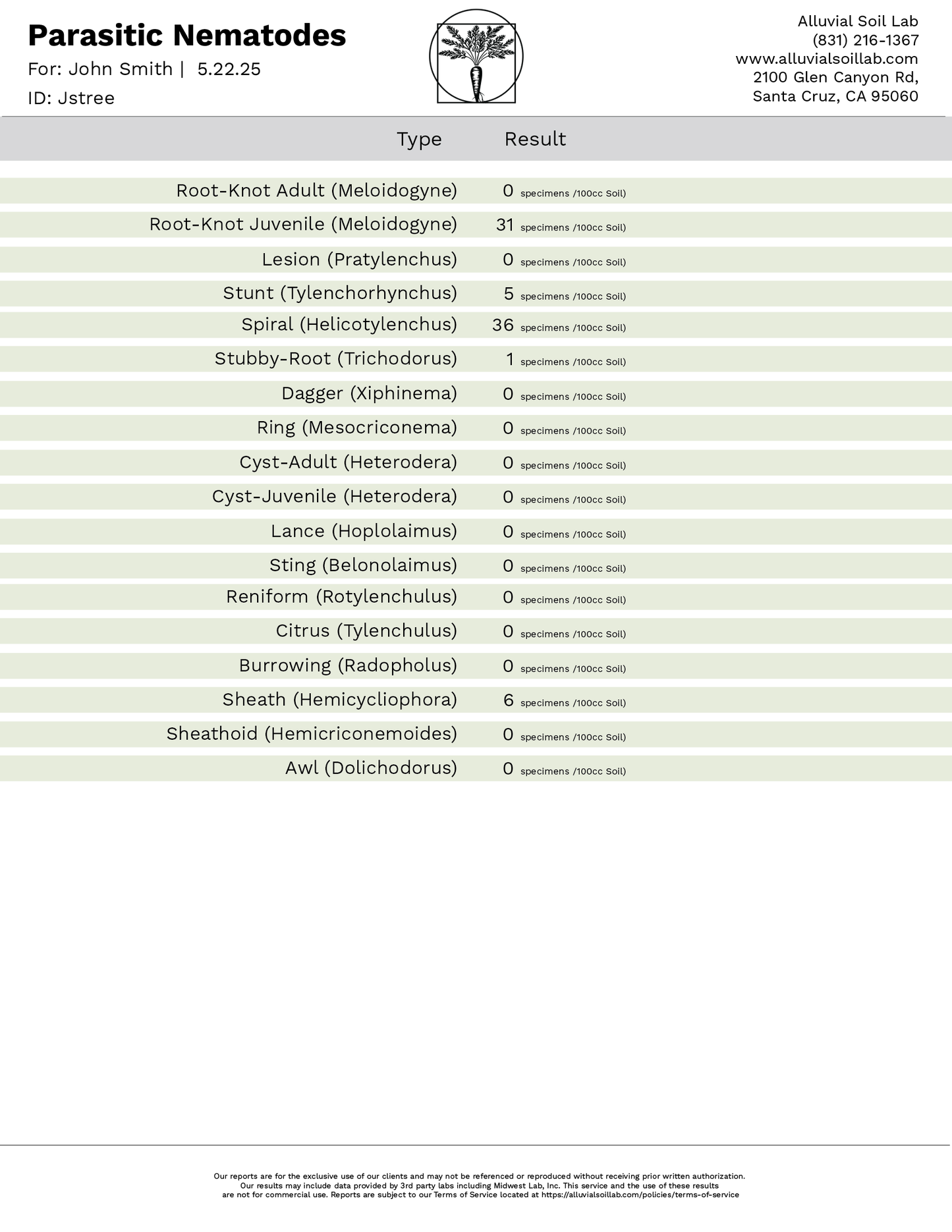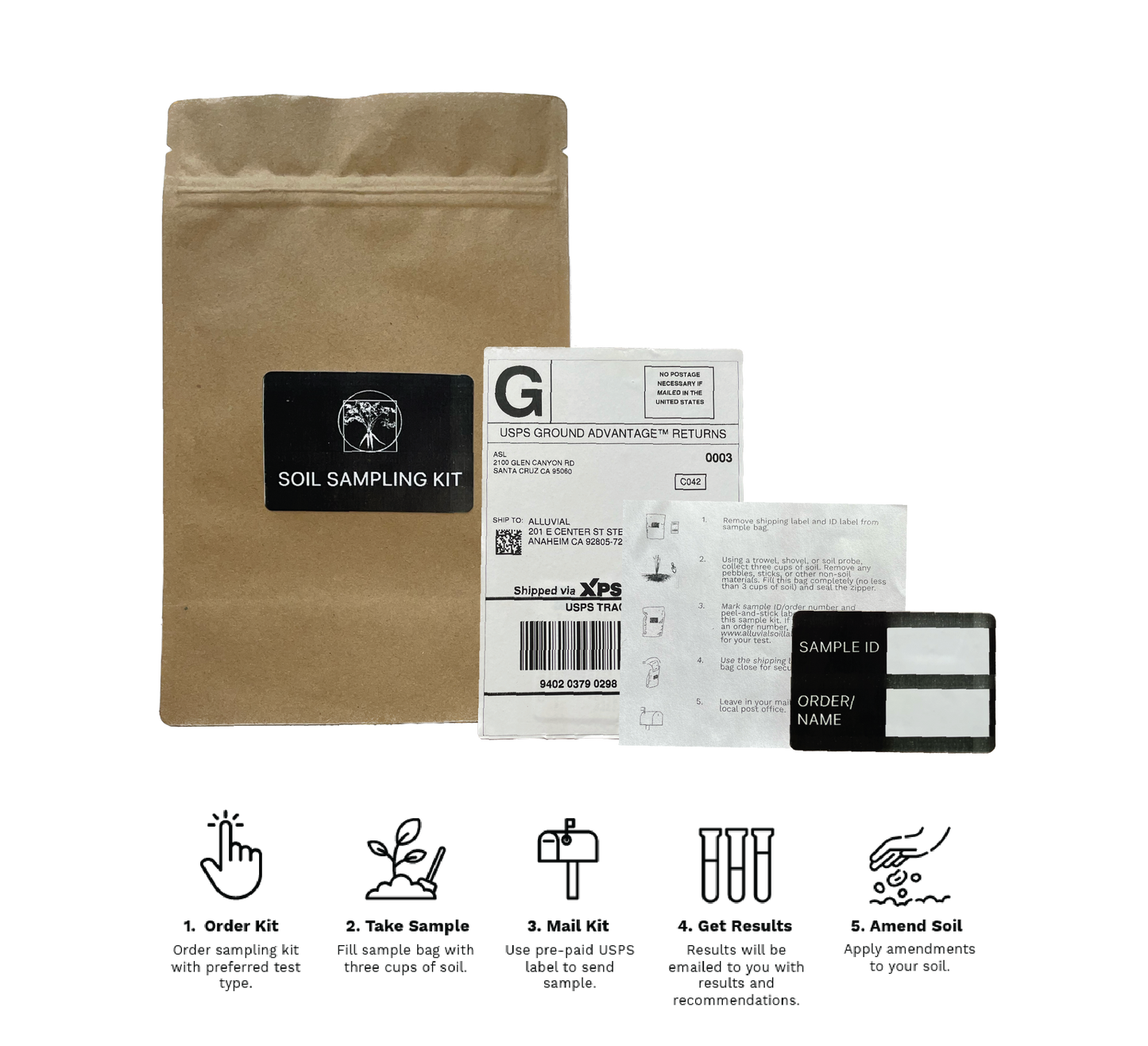Parasitic Nematodes
Parasitic Nematodes
The parasitic nematode soil test is a detailed analysis designed to detect and assess the presence of parasitic nematodes in soil samples. Parasitic nematodes are microscopic worms that can infect plant roots, causing detrimental effects on plant health and productivity. This test provides valuable insights into the extent of nematode infestation, aiding in the development of targeted management strategies to mitigate their impact.
Couldn't load pickup availability
- Fast Turnaround Time
- Accurate Results
- Secure PCI/SSL Payment
- 30-Day Refunds
- Expert Recommendations
- Sustainable Packaging
Protect your crops with our Parasitic Nematodes Test Analysis Kit, offering precise soil nematode analysis for healthy plants and soils.
Report Includes
- Graphs, Data Analysis, and Personalized Recommendations: Detailed visuals and tailored advice for organic or conventional nematode control.
- 15-Minute Phone Consultation: Discuss results with a soil scientist from Alluvial Soil Lab to optimize management.
Key Insights about Parasitic Nematodes in Soil
Nematode Species Identification: Identifies specific parasitic nematode species, enabling targeted control based on their pathogenicity and host preferences.
Distribution and Abundance: Maps nematode distribution and abundance to prioritize treatment in heavily infested areas for effective management.
Impact on Plant Health: Detects nematodes causing stunted growth, wilting, or reduced yields, allowing preventive measures to safeguard crops.
Integrated Pest Management: Supports strategies combining cultural, biological, and chemical methods to reduce nematode populations sustainably.
Soil Health Implications: Links high nematode levels to issues like poor drainage or compaction, guiding improvements for soil productivity.
Economic Impact: Quantifies nematode infestation to estimate yield losses and inform resource allocation for cost-effective crop management.
Monitoring and Follow-Up: Enables ongoing tracking of nematode levels and control effectiveness, refining management practices over time.
Environmental Considerations: Promotes eco-friendly nematode management, minimizing chemical use to protect beneficial organisms and ecosystems.
Enhance crop health with our Parasitic Nematodes Test Analysis Kit. Contact us at (831) 216-1367 for expert plant health testing guidance.
Sampling instructions
Sampling instructions
Materials Needed
i. Clean plastic bucket
ii. Shovel or soil probe
iii. Plastic bag
iv. Labeling materials (marker, tape, or label)
v. Gloves & mask (for contaminated soils)
Sampling Process
Step 1: Define Sampling Area
i. Identify the specific area for testing.
ii. Collect one composite sample per 1,000 sq. ft.
Step 2: Collect Soil Samples
i. Use a clean bucket and shovel/probe to gather soil from three spots.
ii. Dig 6 inches deep, taking a vertical slice.
iii. Avoid compost piles, pet waste, or fertilized areas.
iv. Do not sample wet soil.
Step 3: Prepare Sample
i. Remove debris, break up clumps, and mix soil thoroughly.
Step 4: Package Sample
i. Measure 3 cups of mixed soil into a resealable plastic bag.
ii. Label with Sample ID, Test Type, and Order Number.
Step 5: Submit Sample
i. Purchase a test on our website.
ii. Mail to Alluvial Soil Lab, 201 E Center St, Ste 112-3083, Anaheim, CA 92805.
iii. Use any postal carrier.
For Soil Sample Kit Users
Step 1: Prepare Kit
i. Remove shipping label, ID tag, and instructions.
Step 2: Collect & Package Sample
i. Follow the standard collection process.
ii. Fill the provided bag completely.
iii. Attach the ID tag and secure the shipping label.
Turnaround and Results
i. Timing depends on test type.
ii. Results emailed with soil composition, nutrients, and recommendations.
Safety Precautions
i. Wear gloves/mask when handling potentially contaminated soil.
ii. Wash hands thoroughly after sampling.
Following these steps ensures accurate soil testing for better gardening decisions.
Advanced details
Advanced details
Test includes:
Root-Knot Adult, Root-Knot Juveniles, Lesion, Stunt, Spiral, Stubby-Root, Dagger, Ring, Cyst-Adult, Cyst-Larvae,
Lance, Sting, Reniform, Citrus, Burrowing, Sheath, and Sheathoid



Reviews
-

Jack Algiere | Stone Barns Center
Verified Purchase ✓
Alluvial Soil Lab provided us with comprehensive tests for our organic soil based greenhouse. The results were easy to read and will surely be a great tool for anyone looking to better understand their own soils.
-

Wilson H.
Verified Purchase ✓
I recently started a garden at a community plot, and wanted to know what was in my soil, so I could make more targeted amendments. Jake walked me through how to do so, and after sending my samples in... (read more)
-

Noah M.
Verified Purchase ✓
As a professional in the field I very much appreciate the timely and detailed report, along with skilled follow up communications. I will certainly use Alluvial Soil Lab's services again.
-

Zakary S.
Verified Purchase ✓
Great support and detailed report. Helped advise what options we had to plant trees! Plants are doing incredible! (read more)
-

Peggy C.
Verified Purchase ✓
I recently moved to a property with a vineyard, and wanted to know what type of fertilizers to use and how much to apply. So I did a soil test. I was new to soil testing and with Jake's help and instructions, I was able to successfully collect… (read more)
-

Adrian T.
Verified Purchase ✓
Alluvial makes complex scientific lab results accessible and legible for anyone.(read more)
-

Tom R.
Verified Purchase ✓
I wanted to start a vineyard on my land in Alpine, Ca. Unfortunately, it’s mostly clay. I contacted Alluvial and sent a soil sample...received a land rating with nutrient advice...the first test rows thrived, allowing me to plant more this Spring. Thank you! Couldn’t have done it without you. (read more)




